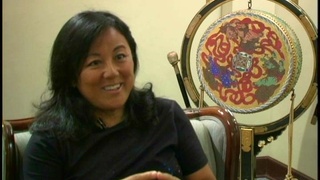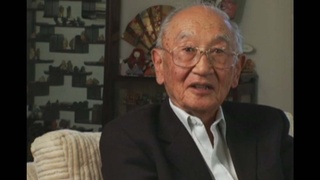Interviews
General Ryder’s faith in the 100th infantry battalion
I think, yes, we were often used in difficult positions because they knew we could do the job, not because they wanted to expend us. In fact in Anzio we didn’t take that many casualties but General Ryder used us to take the key pass when his two regiments had failed to take it. They failed to take Lanuvio and the pass through the Albano Hills - and the First Armor Division was supposed to take advantage of that and make a dash into Rome.
When they failed to take that pass, and one of the regimental commanders was captured, that afternoon he came into the 100th Infantry Battalion - we were a separate battalion, directly under his control - and he told us that we were to take that pass the next morning. And I, as a rather outspoken first lieutenant, cause it was stunned silence, no one else could talk, and I just point blank asked him, I says, “how do you expect one battalion to take a pass where six battalions have failed?” And he very calmly looked at me said, “Because I know the 100th can.” I says, “Well why don’t you commit the 133rd? There’s three battalions.” He said, “Because I question whether they’ll take the path. But you people can.” And we did.
Date: August 28, 1995
Location: California, US
Contributed by: Watase Media Arts Center, Japanese American National Museum
Explore More Videos

Wanting to take a stand
(1916-2010) draft resister, helped form the Heart Mountain Fair Play Committee

Ostracized by the camp newspapers
(1916-2010) draft resister, helped form the Heart Mountain Fair Play Committee

On trial for draft evasion
(1916-2010) draft resister, helped form the Heart Mountain Fair Play Committee

Draft resisters sent to jail
(1916-2010) draft resister, helped form the Heart Mountain Fair Play Committee

Fair Play Committee charged with conspiracy
(1916-2010) draft resister, helped form the Heart Mountain Fair Play Committee

Meeting other Americans in jail
(1916-2010) draft resister, helped form the Heart Mountain Fair Play Committee

Would do the same again
(1916-2010) draft resister, helped form the Heart Mountain Fair Play Committee

Arrested in camp for trying to leave
(1916-2010) draft resister, helped form the Heart Mountain Fair Play Committee

Unable to work when the war broke out
(1913-2013) Doctor specializing in obstetrics in Southern California

Traumatic experiences before camp
(1913-2013) Doctor specializing in obstetrics in Southern California

Joining the hospital unit in Santa Anita Race Track
(1913-2013) Doctor specializing in obstetrics in Southern California

Lost respect for the flag after incarceration
(1913-2013) Doctor specializing in obstetrics in Southern California

“Everybody went in like sheep”
(1913-2013) Doctor specializing in obstetrics in Southern California

Necessary apologies (Spanish)
(b. 1962) Peruvian Poet, Okinawan descendant

Finding out Roosevelt wanted Japan to attack
(1919-2020) Member of the 1800th Engineering Battalion. Promoted Japan-U.S. trade while working for Honda's export division.
